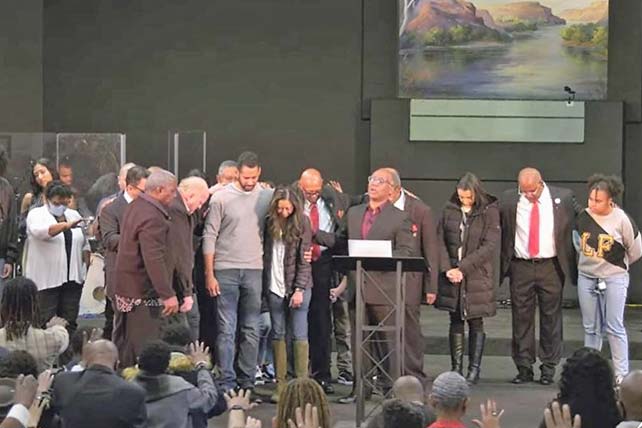MENIFEE, Calif. (BP) – African American Southern Baptists don’t always have the option of worshiping in churches that predominantly share their culture.
The legacy of George Liele, a formerly enslaved Black man who became the first Baptist international missionary from America, is driving an effort to address the disparity, said Greg Perkins, a pastor at the helm of the initiative.
“This is in keeping with his legacy of kingdom multiplication,” said Perkins, leader of the National African American Fellowship Church Planting Initiative launched in 2021 by the National African American Fellowship of the Southern Baptist Convention (NAAF). “Our charter was not to plant multiethnic churches, not to plant multicultural churches,” he said of the church planting initiative.
“Our charter was to plant churches in underserved communities where there might not be a predominantly African American church presence that is affiliated with the Southern Baptist Convention,” said Perkins, senior pastor of The View Church, a multiethnic and majority-African American church in Menifee. “We are defining predominantly African American as being led by an African American where the congregation is more than 50 percent who identify as African American.”
Perkins – who leads a congregation he describes as 62 percent African American and 38 percent white, Asian and Hispanic – said the initiative is not to segregate worshipers by ethnicity.
RELATED: 35 Black Churches To Receive Total of $4 Million for Preservation Work
“It is to provide the broadest amount of opportunity,” he said, “for people to be able to worship in spaces that best meet their need for that season of life.”
NAAF partners with the North American Mission Board Send Network in the initiative, aided by Steve Canter, Send Network’s Northeast regional director.
“When I think of George Liele’s legacy, I am reminded that it’s all about the Gospel and people must first be reconciled to God,” Canter said. “Because of his faithfulness to preach the Word, many people surrendered their lives to Christ, and new churches were planted.
“Despite facing many obstacles, George Liele continued to make it all about the Gospel. The … initiative is also about sharing the Good News of Jesus Christ and overcoming barriers to plant new churches in cities where they are most needed.”
Six established African American pastors have mentored younger pastors in planting churches in the East, Northeast and West in the initiative’s first phase, Perkins said, and other potential new pastors are in training. The initiative’s second phase, in the planning process, will establish church planting residency programs aimed at planting between three and five churches in each region over the next three years.
Among the six established pastors are Brian Kennedy, senior pastor of Mount Zion Church of Ontario, Calif., and associate professor of preaching at Gateway Seminary; and Adron Robinson, senior pastor or Hillcrest Baptist Church in Country Club Hills, Ill., and a member of the SBC Executive Committee.
Kennedy sees in the initiative a safe and nurturing environment that encourages young pastors to faithfully live their purpose.
Kennedy nurtured Brian Wallace in planting City Connect Church as a Mt. Zion mission in North Fontana in January, commissioning Wallace on New Year’s Day.
“Through this particular initiative, we were able to bring more resources,” Kennedy said. He is already planning two additional church plants under the NAAF/NAMB initiative, one of the plants in partnership with another Southern Baptist church.
RELATED: Black Churches More Important to SBC Than Ever Before
“Providing resources for other young ministers to do the work in other parts of the kingdom and expand the kingdom footprint is one of my greatest joys,” Kennedy said. “I could spend all of my energy trying to build Mt. Zion, but Mt. Zion is only in one geographic location,” he said. “But if we plant churches we can be in numerous locations, and we have pastors who are putting in the same kind of effort, and that’s called multiplication. And multiplication is much more effective than addition and subtraction.”
Robinson has provided African American mentorship and guidance for Cameron Dobbins in planting Redeemer Church in Greensboro, N.C., in cooperation with King’s Cross Church, Dobbins’ sending congregation. Robinson attended the assessment session for Dobbins and other church planters in the initiative and was later assigned to work individually with Dobbins.
“It’s been great walking alongside of him and his family and seeing what God is doing through Redeemer,” Robinson said. “I think it’s important for seasoned pastors to connect with younger pastors. We can learn from one another cross-generationally … and we both grow in the process.”
Robinson appreciates the African American presence the church planting initiative provides.
“Some of our young African American church planters did not grow up in the African American church experience,” Robinson said, “and so it helps them to connect with their roots, to see healthy biblical models of the Black church experience so they can be more effective in ministering to their communities.”

